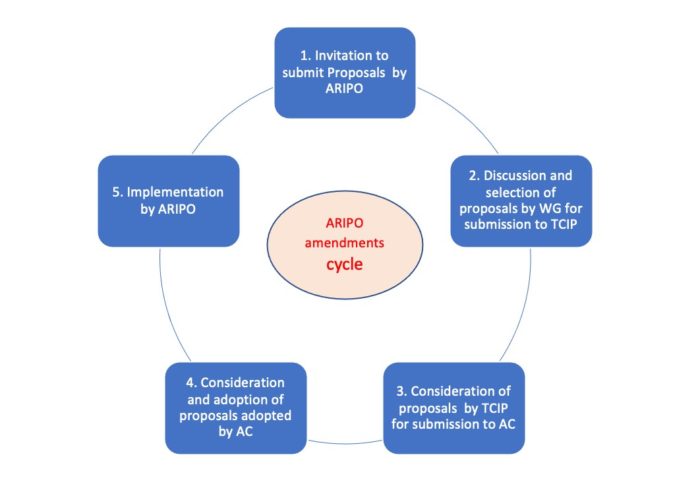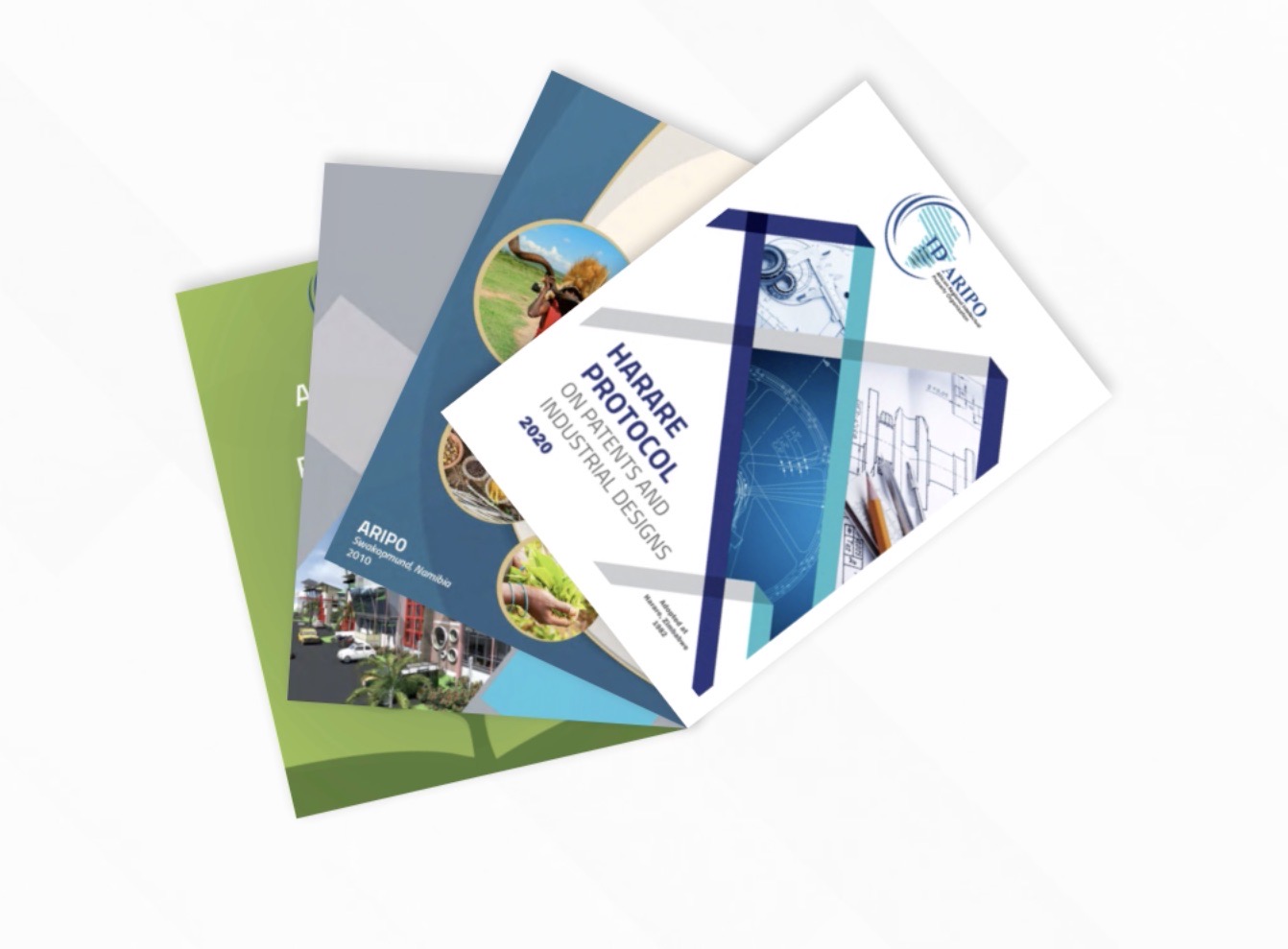By Mr Charles Pundo, Head of Formality Examinations, ARIPO
The Intellectual Property (IP) field is ever-evolving as new innovations and ideas emerge. To keep up-to-date with such changes, ARIPO does this through Working Group (WG) sessions held annually to reflect on how to address the changes and benchmarking with other offices worldwide to counter these evolving trends.
The WG is a product of a decision made by the Technical Committee of the Administrative Council of ARIPO at a session held from September 3-4, 2012, which recommended the establishment of a task force composed of ARIPO stakeholders to review the Banjul Protocol on Marks comprehensively.
The stakeholders who include the ARIPO Member States, IP Agents or Attorneys, researchers, IP right holders, students, or anyone with interest in IP are given an opportunity to contribute to the improvement of the ARIPO Protocols (Legal Instruments) by proposing to the Organization best practices of administering IP matters.
This year, and as per the ARIPO Director General’s vision of ‘creating value together’ stakeholders can participate in improving the ARIPO Protocols at the 10th Session of the Working Group to be held from May 13 to 14, 2021. The WG also aims at strengthening the ARIPO Legal Framework, which can be achieved by balancing all stakeholders’ needs, both in the current IP landscape and the IP environment.
The inception of the Sessions
The first WG Session was held at the ARIPO Secretariat in Harare, Zimbabwe on March 21, 2013. It exclusively discussed and established concrete recommendations to amend the Banjul Protocol to make it more user-friendly and attractive to new member states and users. In attendance were officials from Messrs, Gill, Godlonton and Gerrans; B.W. Kahari Legal Practitioners and B Matanga Legal Practitioners of Zimbabwe, while Messrs Honey and Blanckenberg (Zimbabwe), Adam and Adams (Mozambique) sent their apologies but submitted their written proposals.
The 2nd Session took place on July 23, 2013, at the ARIPO Secretariat, and in attendance were representatives from eight IP Agents/Attorneys and member states, including Liberia, Malawi, Tanzania, Uganda, Zambia and Zimbabwe. Mrs Nancy Samuriwo of Gill Godlonton and Gerrans (Zimbabwe) and Ms Loy Mhando of the Business Registrations and Licensing Agency (Tanzania) were elected the first Chairperson and Vice-Chairperson during this Session.
In her opening remarks at the 5th Session of the Working Group, Mrs Samuriwo referred to the Sessions as “a purposeful response to a well-grounded need for ARIPO’s Protocols to maintain constant adaptation to change to achieve relevance in a constantly changing operating environment. Changes in technology and the growing internationalization of intellectual property rights have, to a large extent, informed the shift in ending user expectations. As a result, users require ARIPO’s Protocols to provide functional systems which are simple, useful, easily accessible and cost-effective”. As such, several amendments have been made, ensuring the ARIPO system is abreast with other systems worldwide.
The current Chairperson, Ms Brenda Matanga of B Matanga Legal Practitioners, at the 7th Session of the WG, said that it was entirely up to the stakeholders to determine how the IP landscape was going to look like. She noted that it would include how the legal instruments were to function and complement other IP laws in our various jurisdictions and compete with other international filing systems. All this was necessary for the improvement of the ARIPO IP system.
Amendments resulting from the WG Sessions
Over the years, the sessions’ scope has extended to cover all ARIPO Protocols and attendance and participation have also improved over the years. Equally, the number of proposals adopted and implemented has increased too. Notable amendments emanating from the WG sessions include:
- Introduction of excess words fee for goods listing for marks;
- Time limits for responding to trademark conditional refusals;
- Subsequent designation of States;
- Introduction of the individual fees structure for Marks;
- Mark opposition procedures;
- Request for examination of patent applications;
- Request for re-establishment of rights;
- Request for extension of time limits;
- Unity of invention provision, and
- Delayed/Expedited examination, among others.
The Cycle
The WG sessions are only one part of the loop required for a proposal to mature to an amendment. Below is a diagrammatical representation of the full cycle:

The process starts with an invitation to all stakeholders to submit proposals for amending the protocols, including the ARIPO Secretariat. The WG then convenes the sessions to discuss the submitted proposals. Each submission is deliberated on, and the WG recommends whether the proposal should be submitted to the Technical Committee on Industrial Property (TCIP), which sits to discuss and further decide to recommend or reject the submission of the proposals to the Administrative Council for adoption. The Administrative Council has the final decision and what it adopts takes effect on January 1 of the following year. At any stage, a proposal can be refused or referred back for further review and redrafting.
COVID-19 and the future of WG
The COVID-19 pandemic scare, travel restrictions and protocols pushed ARIPO to re-consider the mode of convening the WG sessions. The 9th Session was the first to be held virtually via the Zoom platform on July 15, 2020. As the first virtual meeting of the WG, there were doubts about its success, but it turned out to be the best in attendance.
Delegates who participated in the virtual Session were from the following Member States: Botswana, Eswatini, The Gambia, Ghana, Kenya, Liberia, Mozambique, Namibia, Sao Tome & Principe, Sierra Leone, Uganda, Zambia and Zimbabwe. The IP agents/Attorneys were from Kenya, Mozambique, Namibia, South Africa and Zimbabwe.
The improved attendance is attributed to the minimal costs incurred for using a virtual platform. Usually, participants are required to foot their travelling and accommodation costs to attend physical sessions, which indeed deters many from attending. Nevertheless, those unable to physically attend were able to submit their proposals in writing. With the new set up the event is expected to grow in terms of proposals received and attendance.
Invitations to the 10th Working Group Session
Invitations to the next Session of the WG have already been issued. So far, ARIPO has received overwhelming numbers of invitees’ confirmations to attend. The 10th Session is thus promising to be the biggest ever in terms of attendance. The deadline for written proposals is March 31, 2021, and even where one is expecting to attend, it is requested that they submit their proposals in writing by that date.
Conclusion
The sessions have seen several proposals adopted, ensuring that the protocols are abreast with international standards and practices. Since users submit most proposals, they have made the protocols more user-friendly and attractive. A steady increase in application filing has been maintained in most domains except for 2020 due to the effects of COVID-19. Further amendments to the protocols may be required to align them with the new working environment.
Would you like to participate in the 10th virtual Working Group Session?
Contact Mrs Babra Mushaninga on bmushaninga@aripo.org.

